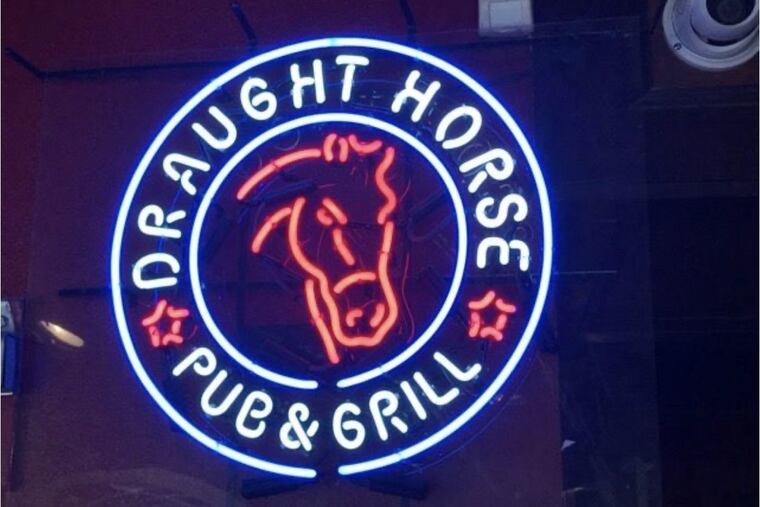Temple bar Draught House will close Sunday, and an auction is on tap so you can buy a piece of it
An online auction will sell the equipment and the memories of the 20-year-old destination.

The Draught Horse, the oldest bar on Temple University’s North Philadelphia campus and a craft-beer destination, will close Sunday, Feb. 21, which happens to be its 20th anniversary. Its lease is expiring.
A spokesman for the university, which owns the bar’s building on Cecil B. Moore Avenue west of Broad Street, said the New Jersey-based operator Frog Spring would not accept a one-year extension on the same terms. Most restaurateurs opt for long-term leases.
The university spokesman said he had not heard of a potential new tenant. Its space does not appear in any publicly viewable commercial real estate sites.
The Draught Horse’s memories will live on. Even before the last beer is poured, its contents are up for sale in an online auction run by Jennings Auction Group of York Haven, Pa. — all of the fittings and trappings of a bar, from dishwashing equipment and dishes to neon signs and beer tap handles. The bidding will end March 18.
The Draught Horse, a sprawling 300-seater outfitted with dark cherry and mahogany and exposed fieldstone, hosted karaoke nights, business meetings, and countless baby showers and going-away parties for Temple professors and staff. It also served as a sports bar popular among the Temple Owls players, who watched NCAA Tournament selection announcements on its TVs.
» READ MORE: How has the pandemic changed Philly’s dive bars?
As a cast of students came and went, many employees were a constant. Mike Frost was a student when he helped Payton Bowman set up the bar. Frost is now director of operations for Stable’s four other restaurants, reporting to Bowman, who runs the company for Charlene Walters. Bowman said the company was exploring the idea of relocating the business as it had received other offers.
“It was a great place to work,” Bowman said. “Business was trying for the first couple of years, but it came around.”
At the Draught Horse’s ribbon-cutting on Feb. 21, 2001, alumni remarked that it was the first large “college bar” in memory. Though corner bars were sprinkled through the neighborhood, as primarily a commuter school, Temple never lent itself to such a social experience on nights and weekends.
But the bar fit into Temple’s expansion in the 1990s. The Draught Horse’s building is part of the Liacouras Center, one part of a spate of development that continues today.
As the Draught Horse marks its final days, it is selling off its enviable beer selection, advertising 16 varieties of 64-ounce growlers for less than $24 to those who bring their own containers. Sunday’s finale is expected to be business as usual, Bowman said.
Next week, auctioneer B.J. Jennings and her workers will come in to begin final work on the online auction. Aside from the machinery, dishes, pots, pans, and what she calls “bread-and-butter kinds of stuff,” there will be the “cool stuff — the decor.”
She will sell neon signs, bar panels with various liquor and beer logos, and tap handles prized by collectors. “I’m in the process of cataloguing them right now,” she said. “I’ve got about a hundred of them sitting in tubs in my living room, and I’ve set up a light box” for photos.
The list of items on the auction site — which she said had hundreds of thousands of registered users — will grow starting next week.
Interest should be keen. When she posted word of the sale on Facebook, she said, she heard from her nephew, who had attended Temple. “He immediately sends me this message, saying, ‘No, they’re closing!’”
Asked how much the auction could fetch, she demurred: “You never know. I know what a stove is going to do. I know what a refrigerator is going to do. I know what a fryer is going to do. They’re just commodities. This other stuff is a part of people’s history.”